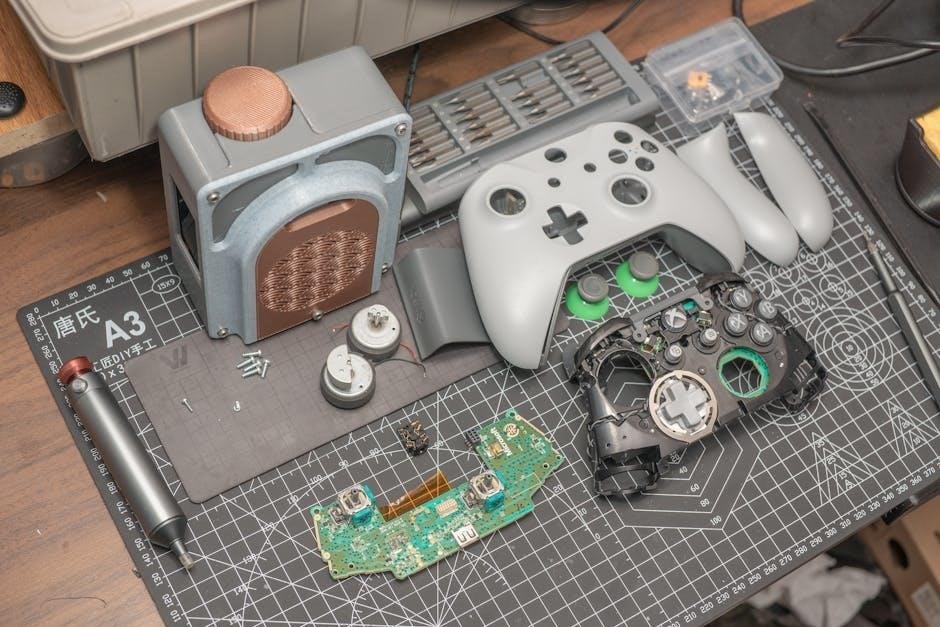
service desk technical interview questions and answers pdf
General Service Desk Interview Questions
General service desk questions focus on customer service skills, problem-solving, and adaptability․ Expect inquiries about handling difficult situations, communication, and common technical support scenarios effectively․
1․1 Commonly Asked Questions

Commonly asked service desk questions often revolve around customer service, problem-solving, and technical troubleshooting․ Candidates are frequently asked about their strengths, weaknesses, and experiences handling difficult customers․ Questions like, “Why is customer service important to you?” or “Describe a time you resolved a technical issue,” are common․ Interviewers also inquire about familiarity with ticketing systems and ITIL frameworks․ Additionally, candidates may be asked to explain their approach to troubleshooting hardware or software issues․ These questions assess both technical knowledge and interpersonal skills, ensuring the candidate can provide effective support and maintain customer satisfaction․ Proper preparation is key to success․
1․2 Importance of Customer Service
Customer service is the backbone of a service desk role, ensuring user satisfaction and maintaining a positive company reputation․ Employers seek candidates who understand the significance of empathy, clear communication, and patience in resolving issues․ Highlighting how excellent customer service fosters trust and loyalty is crucial․ Emphasize your ability to remain calm under pressure and prioritize user needs․ Demonstrating a customer-centric mindset is essential, as it directly impacts the overall success of the support team and the organization․ This showcases your commitment to delivering exceptional service and building strong relationships with clients․
1․3 Self-Assessment and Strengths
Self-assessment is critical in service desk roles, as it demonstrates self-awareness and a commitment to growth․ Highlighting your strengths, such as problem-solving, communication, and technical skills, shows confidence․ Be prepared to discuss areas for improvement, illustrating how you actively work on them․ Employers value candidates who can articulate their strengths clearly, such as adaptability, patience, and attention to detail․ Emphasize how these traits contribute to delivering effective support and fostering positive customer interactions․ This reflects your ability to thrive in a dynamic environment and align with the organization’s goals․

Technical Service Desk Interview Questions
Technical questions assess IT knowledge, focusing on hardware, software troubleshooting, networking basics, and common support scenarios like resolving connectivity issues or configuring systems․
2․1 Fundamental IT Concepts

Interviewers often assess understanding of basic IT concepts like ITIL, SLAs, hardware components, and software applications․ Questions may cover networking fundamentals and operating system functionalities․ These inquiries ensure candidates possess foundational knowledge necessary for troubleshooting and supporting users effectively in a technical environment․ Familiarity with IT frameworks and common tools is also evaluated․ Understanding these concepts demonstrates a candidate’s ability to handle technical issues and communicate solutions clearly․ Strong grasp of these basics is crucial for success in a service desk role․

2․2 Hardware and Software Troubleshooting
Troubleshooting questions evaluate your ability to diagnose and resolve hardware and software issues․ Common topics include identifying common computer errors, understanding BIOS functions, and resolving connectivity problems․ Interviewers may ask about your experience with operating systems, driver updates, and system performance optimization․ Questions often focus on real-world scenarios, requiring you to explain step-by-step solutions․ Demonstrating logical problem-solving and hands-on experience is key․ This section assesses your technical proficiency and ability to handle diverse support requests efficiently, ensuring you can provide effective solutions in a fast-paced service desk environment․
2․3 Networking Basics
Networking basics are fundamental in service desk interviews․ Common questions cover IP addressing, DNS, and DHCP functions․ Interviewers may ask about troubleshooting network connectivity issues, understanding router configurations, and differentiating between LAN, WAN, and Wi-Fi․ Questions also focus on protocols like HTTP, HTTPS, and TCP/IP․ Your ability to explain network fundamentals clearly and concisely is crucial․ Be prepared to discuss real-world scenarios, such as resolving internet outages or configuring network devices․ Demonstrating a solid understanding of networking concepts ensures your readiness to handle technical support tasks effectively in a service desk role․
2․4 Common Technical Support Scenarios
Common technical support scenarios often involve troubleshooting hardware, software, and network issues․ Examples include resolving email client errors, addressing printer malfunctions, and restoring access to enterprise systems․ Interviewers may ask how you handle password reset requests or assist users with installing software updates․ Be prepared to discuss your approach to diagnosing and resolving issues like connectivity problems or device configuration errors․ Highlight your ability to remain calm under pressure, communicate clearly, and resolve issues efficiently․ Providing specific examples from your experience demonstrates your technical proficiency and customer service skills in a service desk environment․
Behavioral and Situational Questions

Behavioral questions assess how you handle challenging situations, such as managing difficult customers or collaborating with team members․ Be ready to share examples of your problem-solving and adaptability in real-world scenarios․
3․1 Handling Difficult Customers
Handling difficult customers requires patience, empathy, and strong communication skills․ Common questions include describing how you would manage an irate user or resolve a conflicting situation․ Stay calm, listen actively, and focus on solutions․ Show willingness to understand their concerns and provide clear, concise explanations․ Highlight your ability to de-escalate tensions professionally․ For example, explain how you would respond to an angry customer by acknowledging their frustration and systematically addressing their issue․ Demonstrating problem-solving and a customer-centric approach is crucial in such scenarios․
3․2 Team Collaboration and Communication

Team collaboration and effective communication are vital for service desk success․ Questions may focus on how you work with colleagues, engineers, and analysts to resolve issues․ Emphasize active listening, clear communication, and the ability to translate technical details into understandable language․ Highlight experiences where teamwork led to efficient problem-solving․ For example, describe how you collaborated with others to brainstorm solutions or shared knowledge to improve team performance․ Showcase your ability to maintain a positive attitude and openness to feedback, fostering a productive team environment․ Effective communication ensures seamless coordination and enhances customer satisfaction․
3․3 Problem-Solving and Adaptability
Problem-solving and adaptability are critical for service desk roles, as you’ll encounter diverse technical issues daily․ Be prepared to share examples of how you’ve resolved complex problems efficiently․ Highlight your ability to remain calm under pressure and think critically․ Discuss how you adapt to new tools, processes, or unexpected challenges․ For instance, describe a situation where you troubleshooted a hardware issue or quickly learned a new system to address a customer’s need․ Showcase your resourcefulness and willingness to escalate issues when necessary while maintaining a focus on timely resolutions and customer satisfaction․

ITIL and Service Management
ITIL (Information Technology Infrastructure Library) is a framework guiding service management․ It includes Incident Management, Problem Management, and Service Level Agreements (SLAs), ensuring efficient service delivery․
4․1 Understanding ITIL Framework
Understanding the ITIL framework is crucial for service desk roles․ ITIL outlines best practices for aligning IT services with business needs, focusing on service strategy, design, transition, operation, and continual improvement․ Key components include Incident Management, Problem Management, and Change Management․ Grasping these concepts demonstrates a candidate’s ability to manage service delivery effectively and troubleshoot issues systematically․ Familiarity with ITIL terminology like Service Level Agreements (SLAs) and Configuration Management Databases (CMDBs) is often tested․ This knowledge ensures seamless integration into service management processes and enhances problem-solving skills․
4․2 Service Level Agreements (SLAs)
Service Level Agreements (SLAs) define the expected service quality and delivery standards between providers and clients․ They outline metrics like response times, resolution periods, and availability, ensuring clarity and accountability․ Understanding SLAs is vital for service desk roles, as they guide prioritization and resource allocation․ Interview questions often focus on explaining SLAs, their components, and their impact on service delivery․ Demonstrating knowledge of SLA compliance and its role in maintaining customer satisfaction is essential, showcasing your ability to align service management practices with business objectives effectively․
4․3 Incident and Problem Management
Incident and Problem Management are critical processes in IT service management․ An incident refers to an unplanned interruption or reduction in service quality, while a problem is the underlying cause of one or more incidents․ Effective management involves identifying, logging, prioritizing, and resolving incidents to restore normal service operation quickly․ Problems, on the other hand, require root cause analysis to prevent recurring incidents․ Interview questions may focus on differentiating between incidents and problems, describing resolution processes, and explaining how these practices improve service quality and customer satisfaction․ Understanding these concepts is essential for service desk roles․
Preparation Tips and Best Practices
Research the company, practice common questions, and use the STAR method to structure your answers․ Stay updated on technical skills and review ITIL frameworks to excel in interviews․
5․1 Researching the Company
Researching the company is crucial for a successful interview․ Understanding their mission, values, and products helps tailor your answers to align with their goals․ Familiarize yourself with their service desk operations, ticketing systems, and customer service ethos․ This preparation demonstrates your genuine interest and proactive approach․ It also enables you to ask insightful questions, showcasing your enthusiasm and readiness to contribute․ By understanding the company’s specific needs, you can highlight relevant skills and experiences, making your application stand out․ This step is vital for creating a positive impression and ensuring alignment with their expectations․
5․2 Practicing Answers
Practicing answers is essential to ace your service desk interview․ Review common questions and prepare clear, concise responses using the STAR method․ Focus on showcasing your problem-solving skills, customer service experience, and technical knowledge․ Role-play with a friend or record yourself to improve delivery․ Familiarize yourself with scenarios like handling difficult customers or troubleshooting issues․ Practice explaining technical concepts in simple terms, demonstrating your ability to communicate effectively․ Regular rehearsal builds confidence and ensures you present yourself professionally․ This preparation helps you stay calm and articulate during the actual interview, highlighting your strengths and readiness for the role․

5․3 Using the STAR Method
The STAR method is a powerful framework for structuring responses to behavioral interview questions․ It stands for Situation, Task, Action, and Result․ Start by describing the context of the situation, then outline the specific task you faced․ Next, detail the actions you took to address the issue, and conclude with the outcome or result of your efforts․ This method ensures clarity and highlights your problem-solving skills and decision-making abilities․ By using STAR, you can effectively communicate your experiences and demonstrate how you handle challenges in a service desk environment․